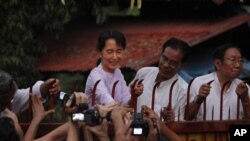Burma democracy activists and Asia regional governments have welcomed the release of Aung San Suu Kyi from detention but are also urging Burma's military government to support calls for national reconciliation.
The release of Burma's pro-democracy leader Aung San Suu Kyi, from detention Saturday has been widely welcomed by Burmese expatriate communities, democracy activists and regional governments.
Aung San Suu Kyi, released after the end of an 18 month sentence, has spent much of the past two decades in some type of government confinement for her calls for democracy in Burma.
Bo Kyi, a former political prisoner himself and secretary of the Assistance Association for Political Prisoners (Burma) based in Mae Sot Thailand, hoped Suu Kyi's release would mark a step toward democracy in Burma.
"I am extremely happy for her release as well as the Burmese people who are extremely happy. Now thousands of people are singing to Daw Aung San Suu Kyi in Burma," he said. "She will do her best for the national reconciliation and then to restore democracy and human rights in Burma."
"Bridge between political groups"
Debbie Stothardt, spokeswoman for rights group, Alternative ASEAN Network, says Aung San Suu Kyi's role in Burma would be as a "bridge" between competing political groups, ranging from the military to Burma's ethnic minorities.
"Aung San Suu Kyi is the single most unifying force in Burma and Burma really at this time needs someone like Aung San Suu Kyi to be able to travel around, to be able to dialogue with all the stake holders and to put fresh energy back into the movement," she said.
Stothardt also pointed to rising anger after the recent general elections that have resulted in a pro-military party close to Senior General Than Shwe securing some 75 per cent of the votes. But analysts and other Burmese political parties claimed there was widespread fraud and voting manipulation by the military.
Aung Din, a spokesman for the U.S. Campaign for Burma, says Aung San Suu Kyi is now expected to once again take a political role in Burma after her detention.
"As a leader she will move about freely, she will talk to the media and she will talk to the people," he said. "She will get involved with the politics as soon as possible. The general public admire her as the one and only leader who can bring democracy, justice to their country. So there's no doubt that she's a serious threat to the military junta especially to top military, Senior General Than Shwe."
International pressure
But Aung Din also believed international pressure had played a crucial role in ensuring Suu Kyi's freedom, including that from the United States and the United Nations.
United Nations Secretary-General Ban Ki-Moon, in a statement, urged Burmese authorities to free other political prisoners. Rights groups say there are more than 2,200 political prisoners in Burma, including journalists and former members of Aung San Suu Kyi's National League for Democracy.
Neighboring Thailand in a statement from its Foreign Affairs Ministry said Aung San Suu Kyi's release marked another important step in national reconciliation and democratization process in Burma.
Australia, in also welcoming Aung San Suu Kyi's freedom, said the Nobel Peace Prize laureate had paid a heavy price for advocating freedom and called on the Burmese authorities to embark on an "inclusive and genuine process of national reconciliation."
Timeline of Major Political Events in Burma




